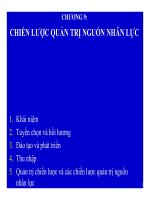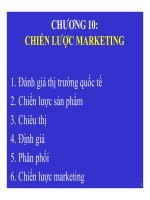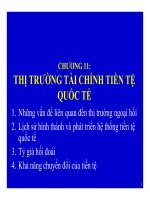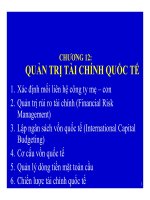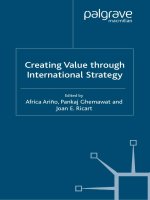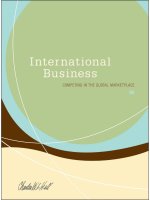International business
Bạn đang xem bản rút gọn của tài liệu. Xem và tải ngay bản đầy đủ của tài liệu tại đây (1.18 MB, 34 trang )
LONDON SCHOOL OF COMMERCE
COLOMBO CAMPUS SRI LANKA
MBA FOR EXECUTIVES
MODULE ASSIGNMENT:
International Business
Student Name
:
Janaka Perera
Student Registration No. :
0170APAP0314
Module Lecturer
:
Mr. Anand Walser
Module Tutor
:
Ms. Apsara Hewage
Date Submitted
:
24th March, 2015
Total Word Count
:
4,068 Words
EXECUTIVE SUMMARY
The foundation of this report was to assess the product portfolio of Phoenix and closely evaluate the adequacy
of the chosen product line for an internationalization project. The author has evaluated the possible products
and has selected plastic furniture as the most appropriate line of products for international business strategies.
The host country evaluation was also completed considering the availability of raw materials and labor
component where the State of Qatar was the preferred choice.
The report evaluated the market analysis of the host country where all internal factors were analyzed for
conditional and competitiveness. The information received was used to determine the possible market entry
strategy. Also the barriers Phoenix may encounter both in home and host countries which might create
barriers were analyzed for possible counter strategies to be formulated.
Culture is another important factor for international business and this area was also analyzed using known
culture theories for both countries as this could be important for a smooth operation also knowledge in this
area will be beneficial for strategizing against possible culture related impacts.
The main section of this report is the final business strategies where business entry process is at the pinnacle.
Considering all revealed information, the Joint Venture was selected as the entry mode of choice supported by
business strategies concerning internationalization, location, staffing and marketing which clearly defines
do’s and don’ts of international business plans for Project Qatar.
International Business is a fascinating subject with many interesting factors to be considered before even
finalizing the business strategies. Therefore completing this consultant’s report successfully has given the
author key learning points where he has enjoyed thoroughly while using all the knowledge gained to churn out
a very successful report with valid points to be considered.
Assignment on International Business
by Janaka Perera (0170APAP0314)
Page | 2
TABLE OF CONTENTS
Number & Title
Page
Executive Summary…………………………………………..……………………………….
02
Table of Contents……………………………………………..………………………………
03
List of Tables…………………………………………………..………………………….......
06
List of Figures…………………………………………………..…………………...................
07
List of Abbreviations……………………………………………..………………………........
08
1.0 Introduction………………………………………………………………………………..
09
1.1 Plastic Industry Overview ………………………………………………………………
09
1.2 Background of “Phoenix” ………………………………………………………………
09
1.2.1 Company Vision …………………………………………………………………..
09
1.2.2 Company Values …………………………………………………………………..
10
1.2.3 Range of Operation ………………………………………………………………..
10
1.2.4 Products from Phoenix …………………………………………………………….
11
1.2.5 Company Core Competencies …………………………………………………….
12
1.3 Scope of Report …………………………………………………………………………
12
1.4 Objectives ………………………………………………………………………………
12
1.5 Methodology ……………………………………………………………………………
13
2.0 Products for Internationalization ……………………………………………………………
13
2.1 Project Qatar – Preferred Products ………………………………………………………
13
2.2 Product Performance …………………………………………………………………….
14
3.0 Target Market Analysis …………………………………………………………………….
14
3.1 Host Country Analysis ………………………………………………………………….
14
3.2 Qatar – PESTLE Factors ………………………………………………………………..
16
3.3 Qatar - National Competitive Analysis ………………………………………………….
17
4.0 Barriers for Internationalization ……………………………………………………………
18
4.1 Domestic Barriers ………………………………………………………………………
18
4.1.1 Limited Access to Finance …………………………………………………………
18
4.1.2 Regulatory Barriers …………………………………………………………………
18
4.2 Host Country Barriers …………………………………………………………………...
18
4.2.1 Difficulty Sourcing Local Partners …………………………………………………
19
Assignment on International Business
by Janaka Perera (0170APAP0314)
Page | 3
4.2.2 Acquiring Property …………………………………………………………………
19
4.2.3 Work Time Practices ………………………………………………………………
19
4.2.4 Labor Practices …………………………………………………………………….
19
4.2.5 Documentation Issues ………………………………………………………………
19
4.2.6 Driving License Requirements …………………………………………………….
19
4.2.7 HR Management Issues ……………………………………………………………
20
5.0 Analysis of Cultural Differences …………………………………………………………..
20
5.1 Hofstede Cultural Analysis Model ………………………………………………………
20
5.2 Impacts of Cultural Difference …………………………………………………………...
21
5.2.1 Mediation and Settlements …………………………………………………………
21
5.2.2 Personal Style ……………………………………………………………………...
22
5.2.3 Communication ……………………………………………………………………
22
5.2.4 Decision Making ………………………………………………………………….
22
5.2.5 Compassion towards Time ……………………………………………………….
22
5.2.6 Risk Assessment ………………………………………………………………….
23
5.2.7 Emotionalism ……………………………………………………………………..
23
6.0 Business Entry Strategy ……………………………………………………………………
23
6.1 Justifications for Business Entry Strategy ………………………………………………
24
6.1.1 Access to Resources ………………………………………………………………
24
6.1.2 Ease of Access …………………………………………………………………….
24
6.1.3 Sharing Risks, Costs & Control ……………………………………………………
24
6.2 International Business Strategy …………………………………………………………
24
6.2.1 Competitive Advantage ……………………………………………………………
25
6.2.2 De-Centralized Operation ………………………………………………………….
25
6.2.3 Independence ………………………………………………………………………
25
6.2.4 Local Sourcing ……………………………………………………………………
25
6.2.5 Innovation ………………………………………………………………………….
26
6.2.6 Management Style …………………………………………………………………
26
6.3 Location Strategy ……………………………………………………………………….
26
6.3.1 Facilities …………………………………………………………………………..
26
6.3.2 Labor ……………………………………………………………………………….
26
6.3.3 Business Logistics ………………………………………………………………….
27
Assignment on International Business
by Janaka Perera (0170APAP0314)
Page | 4
6.3.4 Infrastructure ………………………………………………………………………
27
6.3.5 Target Consumers ………………………………………………………………….
28
6.3.6 Suppliers …………………………………………………………………………..
28
6.4 Staffing Strategies ………………………………………………………………………
28
6.4.1 Employment Procedure …………………………………………………………..
28
6.5 Marketing Strategy ……………………………………………………………………..
29
Conclusion……...……………………………………………………………………….……..
31
References………………………………………………………………………………….….
32
Bibliography……………………………………………………………………………………
34
Assignment on International Business
by Janaka Perera (0170APAP0314)
Page | 5
LIST OF TABLES
Number& Title
Page
1.1: Phoenix Management Team ……………………………………………………………….
10
1.2: Core Competencies of Phoenix …………………………………………………………….
13
3.1: Furniture Imports by Qatar …………………………………………………………………
15
3.2: Qatar – PESTLE Factors …………………………………………………………………...
16
3.3: Qatar – National Competitive Analysis …………………………………………………….
17
5.1: Cultural Analysis – Sri Lanka vs. Qatar ……………………………………………………
21
6.1: Project Qatar – Marketing Strategies ………………………………………………………
29
Assignment on International Business
by Janaka Perera (0170APAP0314)
Page | 6
LIST OF FIGURES
Number & Title
Page
1.1: World Plastic Demand Distribution by polymer ……………………………………………
09
1.2: Core Values of Phoenix …………………………………………………………………….
10
1.3: Countries that products from Phoenix are exported to …………………………………….
11
1.4: Products from Phoenix ……………………………………………………………………
11
2.1: Phoenix furniture product mix …………………………………………………………….
13
2.2: Market Share of Plastic Furniture – Sri Lanka ……………………………………………
14
5.1: Hofstede Model Cultural Analysis – Sri Lanka vs. Qatar ………………………………...
20
6.1: Popular Operating Models for Market Entry ………………………………………………
23
6.2: Internationalization Strategies ………………………………………………………………
25
6.3: The Marketing Mix ………………………………………………………………………..
30
Assignment on International Business
by Janaka Perera (0170APAP0314)
Page | 7
LIST OF ABBREVIATIONS
BOD
- Board of Directors
CAPEX
- Capital Expenditure
CEO
- Chief Executive Officer
FIFA
- Fédération Internationale de Football Association
FY
- Financial Year
GCC
- Gulf Corporation Countries
JIT
- Just-in-Time
JV
- Joint Venture
MSA&L
- Ministry of Social Affairs and Labor
OPEC
- Organization of Petroleum Exporting Countries
OPEX
- Operating Expenditure
PE
- Polyethylene
PET
- Polyethylene Terephthalate (thermoplastic polymer resin)
Phoenix
- Phoenix Industries Limited
PP
- Polypropylene
PS-EPS
- Polystyrene / Expanded Polystyrene
PVC
- Polyvinyl Chloride
QEWC
- Qatar Electricity & Water Company
Sq./ft.
- Square Feet
SWOT
- Strengths, Weaknesses, Opportunities & Threats analysis
UNIDO
- United Nations Industrial Development Organization
YoY
- Year on Year
Assignment on International Business
by Janaka Perera (0170APAP0314)
Page | 8
1.0 INTRODUCTION
1.1 PLASTIC INDUSTRY OVERVIEW
Global demand for plastics has shown a significant growth and in 2013, the global production reached
nearly 300 Million metric tons with China being one of the main producers.
Plastics are being used in different products and can replace glass, metal and wood and can be used in
thousands of different industries.
Figure 1.1: World Plastic Demand Distribution by polymer
(Source: ICIS Consulting)
Sri Lankan plastic industry currently is 50 years old and technologically sophisticated. As per research
done by UNIDO, annual Sri Lankan consumption of plastics is 180,000 metric tons with an annual
growth of 10-12% with 900+ industries, making it one of the most competitive industries.
1.2 BACKGROUND OF “PHOENIX”
Founded in 1976, Phoenix Industries Ltd. (herein known as Phoenix) was the pioneer organization in
Sri Lanka and South East Asian region for plastic injection molding. Company, the foremost and
biggest plastic producer in Sri Lanka with a modern manufacturing plant with machinery for injection
& blow molding and mechanized PET product line with products ranging from household plastic wear,
furniture, bottles, plastic packaging etc. (Phoenix, 2015)
1.2.1 COMPANY VISION
“Name for Plastic” depicts that Phoenix’s objective is to be the primary brand for plastic products
in Sri Lanka.
Assignment on International Business
by Janaka Perera (0170APAP0314)
Page | 9
1.2.2 COMPANY VALUES
Figure 1.2: Core Values of Phoenix
(Source: Phoenix, 2015)
1.2.3 RANGE OF OPERATION
Currently Phoenix is managed by a Board of Directors assisted by a capable Management Team
consisting of the following positions:
Table 1.1: Phoenix Management Team
(Source: Phoenix, 2015)
Phoenix currently has many products being the most preferred in their respective industries. The quality of
products offered and robust management culture has enabled the company to achieve this enviable position.
Assignment on International Business
by Janaka Perera (0170APAP0314)
Page | 10
Phoenix has experience in international markets their products having success internationally already with
many being exported to foreign countries. Phoenix strategy in attaining international success is by assuring
international expectations by offering high quality products.
Figure 1.4: Countries that Products from Phoenix are exported to
(Source: Phoenix, 2015)
1.2.4 PRODUCTS FROM PHOENIX
Phoenix has introduced several products during 2013/14 in consumer and household sector.
Furniture and Household sectors have shown significant growth of 60% during this period when
company growth was 48% which was very encouraging. Below illustration highlight the range of
products currently representing Phoenix.
Figure 1.3: Products from Phoenix
(Source: Phoenix, 2015)
Assignment on International Business
by Janaka Perera (0170APAP0314)
Page | 11
1.2.5 COMPANY CORE COMPETENCIES
Phoenix holds an array of core competencies where the competitive market requirements are met to
exceed all customer expectations.
Table 1.2: Core Competencies of Phoenix
(Source: Phoenix, 2015)
1.3 SCOPE OF REPORT
Evaluate selected products to successfully enter international business arena.
Assess Qatar marketing conditions and Phoenix’s ability to compete in such conditions.
Strategies to be adopted by Phoenix enabling growth, brand value, revenue and profitability.
1.4 OBJECTIVES
To review the adequacy of the product and host country analysis to evaluate the efficacy.
Recommendations to attain business objectives and effectiveness in international markets.
Offer Phoenix with internationalization strategies in preparation for international entry.
Assignment on International Business
by Janaka Perera (0170APAP0314)
Page | 12
1.5 METHODOLOGY
Analysis of Product, Company and Management in local context
Evaluate host country market conditions and PESTLE factors
Recommending proven business strategies
Use market best practices and marketing theories
2.0 PRODUCTS FOR INTERNATIONALIZATION
2.1 PROJECT QATAR - PREFERRED PRODUCTS
The product line recommended for “Project Qatar” is Phoenix Furniture line which has a wide range of
products comprising of chairs, tables, outdoor and kiddie’s ranges which can be positioned differently
in respective segments. The complete furniture product portfolio is illustrated below:
Figure 2.1: Phoenix furniture product mix
(Source: Phoenix, 2015)
Assignment on International Business
by Janaka Perera (0170APAP0314)
Page | 13
2.2 PRODUCT PERFORMANCE
Phoenix currently maintains a dominant chunk in Sri Lankan plastic furniture industry which is
highlighted in below market shares.
Figure 2.2: Market Share of Plastic Furniture – Sri Lanka
(Source: Market Statistics)
It is evident that Phoenix is the undisputed leader in Sri Lankan plastic furniture market with annual
consumption of approx. 86,500 metric tons with estimated YoY growth rate of 40%, making Phoenix a
worthy candidate for internationalization.
3.0 TARGET MARKET ANALYSIS
3.1 HOST COUNTRY ANALYSIS
The host country this consultancy report is recommending is the State of Qatar, an Emirate in Persian
Gulf Region with an indigenous population of <1,000,000.
Furniture industry in Qatar is booming with the government’s investment for infrastructure and
motivation triggered by hosting of 2022 FIFA World Cup and related development.
The market in Qatar comprises of the following segments which could be targeted by Phoenix for its
furniture range.
New Constructions
- Apartments, Villas, Bungalows, Office Buildings, Hotels, Restaurants and
Recreational, Stadiums, Sports Centers, Gymnasiums and Athlete Villages.
Assignment on International Business
by Janaka Perera (0170APAP0314)
Page | 14
Renovation Projects
Kiddies / Baby Range
Analysis of furniture import Statistics reveal that the trend for plastic furniture imports is declining and
more industries are looking to manufacture furniture in Qatar with abundance of raw materials and the
availability of low-cost labor from South and South-East Asian countries. Qatari furniture import
statistics from 2009 – 2012 are noted below. (JFEMA, 2013)
Table 3.1: Furniture Imports by Qatar
(Source: UN Comtrade)
Assignment on International Business
by Janaka Perera (0170APAP0314)
Page | 15
3.2 QATAR – PESTLE FACTORS
Summary of Qatar PESTLE factors associated with furniture industry is listed below.
Table 3.2: Qatar – PESTLE Factors
(Source: United Nations, 2002)
Assignment on International Business
by Janaka Perera (0170APAP0314)
Page | 16
3.3 QATAR – NATIONAL COMPETITIVENESS ANALYSIS
This report used Porter’s Diamond Analysis to highlight competitive benefits by Qatar attracting
business. Summary of National Competitiveness Analysis is noted below.
Table 3.3: Qatar – National Competitiveness Analysis
(Source: United Nations, 2002)
Assignment on International Business
by Janaka Perera (0170APAP0314)
Page | 17
4.0 BARRIERS FOR INTERNATIONALIZATION
4.1 DOMESTIC BARRIERS
Domestic business setting usually comprises of barriers to international business and needs to be
addressed before host country barriers are dealt with and should be identified at an early stage.
4.1.1 LIMITED ACCESS TO FINANCE
This is one of domestic barriers Phoenix will face includes trade finance and working capital.
Trade Finance is needed to finance sales to international buyers which create a distinct advantage
over competition. Therefore Phoenix will require to source adequate finances or a financier (with
terms and conditions discussed) prior to commencement of Project Qatar.
Having limited Working Capital is another domestic barrier for Phoenix as this could create
difficulties to fund their international business. Since Phoenix will initially utilize their own
finances to fund ‘Project Qatar’, Working Capital could create barriers.
4.1.2 REGULATORY BARRIERS
Sri Lanka has laws regulating local organizations in opening businesses internationally which
include labor, exchange control, tax etc.
Sri Lankan National Policy for Labor Migration specify the importance of contribution from all
international workers to the country economy through FOREX transfers which could create
employee demotivation affecting efficiency.
Sri Lankan Foreign Employment Bureau is currently governed by a statute initiated in 1985 and not
many changes had been made since then. This is a barrier to Phoenix as many of current employee
activities would affect by this ageing regulation needing immediate amendments.
Sri Lankan Labor Act insists on bilateral agreements between the company and host country on
migrant workers which would create difficulties for Phoenix in attracting skilled labor from Sri
Lanka for Project Qatar. (ILO, 2008)
4.2 HOST COUNTRY BARRIERS
Phoenix will also need to be concerned about the barriers already exist in Qatar preventing successful
execution of Project Qatar.
Assignment on International Business
by Janaka Perera (0170APAP0314)
Page | 18
4.2.1 DIFFICULTY SOURCING LOCAL PARTNERS
Qatar Investment policies specifies any foreign company seeking to initiate business would require
a local partner where 51% of the stake to be by Qatari partner and Phoenix having only 49%.
However, this does not apply for Joint Ventures where stakes and profit margins are determined by
the JV agreement between the businesses. (Latham & Walkins, 2013)
4.2.2 ACQURING PROPERTY
Qatari law doesn’t allow any foreign companies to own land in Qatar but may lease property long
term up to 50 years. However, established companies mightn’t advocate this ruling as it creates
uncertainty in business where it offers more power to the local partner.
4.2.3 WORK TIME PRACTICES
Qatar is an Islamic Country where work times are determined by religious beliefs which is different
to Sri Lanka. A working week in Qatar is from Saturday till Wednesday with Thursday and Friday
being weekends where Sri Lankan working week is similar to the west.
This may create difficulties with times to liaise with international market restricted to only three (3)
days a week (Monday to Wednesday) which is an adjustment when exporting to west.
4.2.4 LABOR PRACTICES
Local labor law has made hiring of Qatar Nationals to high positions of companies a mandatory
requirement. This is applicable regardless of competencies and significantly higher wages are to be
paid which may create efficiency and motivational barriers.
4.2.5 DOCUMENTATION ISSUES
As per regulations, all foreign import and export transactional documents require attestation by
local embassies creating an extra phase of a complicated logistics process and since these
authorities work as per Qatar timelines creating delays for Phoenix resulting in loss of revenue.
4.2.6 DRIVING LICENSE REQUIREMENTS
Expatriate workers require a driving license obtained from Qatar except for Caucasians where they
can convert their licenses. Therefore all other staff needs to undergo a rigorous driving examination
which is costly and time consuming. Also, all driving staff should already have a valid local license.
Therefore this will create efficiency issues in transferring their Sri Lankan staff to Qatar.
Assignment on International Business
by Janaka Perera (0170APAP0314)
Page | 19
4.2.7 HR MANAGEMENT ISSUES
Employee hiring process is one of the most difficult areas in Qatar. Phoenix will need to tie up with
a locally registered recruitment firm where terms and conditions need to be agreed.
Also due to inclement weather conditions in Qatar, employees hired by the company will need to be
provided with adequate accommodation or allowances, transportation, food and proper working
conditions with air conditioning made mandatory. (Eurodev, 2010)
5.0 ANALYSIS OF CULTURAL DIFFERENCES
Culture is described as combined adjustment of mind which differentiates the followers of one group of
people from another group including a collection of behaviors, conducts and morals of a civilization.
(Hofstede, 1984)
5.1 HOFSTEDE CULTURE ANALYSIS MODEL
Author has critically analyzed cultures of Sri Lanka and Qatar using Hofstede’s Cultural Model where
several elements were scrutinized to ascertain the cultural differences to uncover business advantage.
Figure 5.1: Hofstede Model Cultural Analysis – Sri Lanka vs. Qatar
(Source: www.geert-hofsetede.com)
Assignment on International Business
by Janaka Perera (0170APAP0314)
Page | 20
Table 5.1: Culture Analysis – Sri Lanka vs. Qatar
(Source: Author’s work)
5.2 IMAPACTS OF CULTURAL DIFFERENCE
The consultative report analyzed differences in both Sri Lankan and Qatari cultures and evaluated the
impact of management and overall administrative functions of Project Qatar. (Hofstede, 1984)
5.2.1 MEDIATIONS AND SETTLEMENTS
Communication and negotiations play a major part with both cultures showing significant
differences. Sri Lankans are normally high context with more spoken words with less implied
information and Qataris are low context with less communication with more direct approach.
Assignment on International Business
by Janaka Perera (0170APAP0314)
Page | 21
Phoenix when entering a country with a low context culture, need to source business partners with
high efficiency levels to safeguard business competence.
Customer service levels also differ with customers from Qatar expecting their concerns to be
attended immediately and Phoenix need to evaluate this factor to prevent high customer churn.
Buying decisions will play a part in low context culture with faster decisions made based on
personal needs. Phoenix to consider this to maintain customer satisfaction levels to encourage
repeat purchases and positive brand image where understanding new challenges is important.
Qatari culture is west influenced where detailed contracts conclude deals which are governed by
law. Contracts usually take finalizing time eventually affecting final deal timelines.
5.2.2 PERSONAL STYLE
Phoenix require to consider impact affecting communication with Qatar culture being informal will
be friendly during negotiations with personal matters also being discussed where people are
addressed by first names regardless of their positions.
This is positive for Phoenix where informal personalities tend to be easier considering all
negotiations are kept candid and reliable.
5.2.3 COMMUNICATION
The local communication vastly influenced by west is direct whereas more straightforwardness is
the main trait with less facial expressions, body language and figure of speech.
Phoenix from indirect culture need to adjust to succeed in these conditions as it create motivational
issues among Sri Lankan staff requiring conflict resolution and negatively affecting efficacy.
5.2.4 DECISION MAKING
Qatari culture is more individual based therefore decision making and negotiations are also
individual based where the supervisor has the decision making power which is in contrast to Sri
Lankan where decisions are taken collectively. Also the decision makers usually take part in
negotiations resulting in typical negotiations being concluded promptly.
5.2.5 COMPASSION TOWARDS TIME
Attitude towards time in Qatar is considered as “Time is money”. These cultures values time and
seldom wastes time for self and others. Although this is a positive custom, it could also be an effort
to obscure which results in uncertainty. Businesses operate in a timely manner where they’re aware
and abide by appointment timelines.
Assignment on International Business
by Janaka Perera (0170APAP0314)
Page | 22
Therefore Phoenix should be aware of this culture difference where Sri Lankans generally are time
insensitive creating negative business impact.
5.2.6 RISK ASSESSMENT
Risk assessment is different in Qatar in comparison to Sri Lanka where contextual information
concerning risks and related decision making is considered less important as it’s a risk taking
culture. Phoenix will need to inculcate a risk assessment strategy in Project Qatar plans.
5.2.7 EMOTIONALISM
This represent how each culture express emotions when negotiating and Qatar culture being less
emotional, are opinionated and doesn’t care about emotions of the counterpart. Therefore
negotiators from cultures with high emotions might get uncomfortable or feel insulted.
Phoenix needs to be mindful of this when dealing with such culture differences when negotiating
agreements.
6.0 BUSINESS ENTRY STRATEGY
This consultation report considering all information herewith recommend “Joint Venture” as the most
appropriate entry method for Phoenix which ensures business growth with high efficiency generating
healthy profitability which is one of the most popular entry strategies. (VR Business, 2009)
Figure 6.1: Popular operating models for market entry
(Source: www.dupress.com)
Assignment on International Business
by Janaka Perera (0170APAP0314)
Page | 23
6.1 JUSTIFICATIONS FOR BUSINESS ENTRY STRATEGY
The author has critically analyzed all information for recommending JV as the most appropriate
business entry strategy for Project Qatar. (Edinburgh, 1996)
6.1.1 ACCESS TO RESOURCES
Having a JV will be beneficial to Phoenix including staff, finances and technology etc.
Starting a new venture in a new country might stretch resource capability of any company and a JV
agreement might give Phoenix an advantage with the partner company sourcing skilled staff from
host country using local knowledge and obtaining appropriate technologies. JV will also give added
strength in financials with more spending power for the venture combining assets of two entities.
6.1.2 EASE OF ACCESS
A JV will open avenues for customers and distribution channels with more control considering
partnering company’s knowledge of the local market.
Phoenix needs to utilize partner’s locality advantage to obtain property for the project initiation due
to foreign company’s inability to own property as per local property laws.
Phoenix is to utilize customer databases of the JV partner to gain a competitive advantage while
being able to device strategies to establish the brand name.
This will enable Phoenix to develop their expertise on managing their business in host country in
connection with Project Qatar.
6.1.3 SHARING RISKS, COSTS & CONTROL
A joint venture will enable responsibilities of administration and management of the project to be
shared thus sharing risks not only financially, but also in Human Resource, regulatory, business
continuity, information technology areas as well. This will be beneficial for both partners as they
can focus on adequate management of business rather than losing focus on trivial matters.
A JV will give Phoenix better control over operations and access to local market knowledge which
is a business benefit.
6.2 INTERNATIONAL BUSINESS STRATEGY
An internationalization strategy is required for organizations to operate internationally and
independently with minimal management from the parent companies. Below illustration highlight the
most appropriate strategy organizations can adopt considering international business entry.
Assignment on International Business
by Janaka Perera (0170APAP0314)
Page | 24
Figure 6.2: Internationalization Strategies
(Source: www.global-strategy.net)
Considering above business strategies, the author recommend “Multi-domestic Strategy” as the most
appropriate strategy for Project Qatar. This strategy involves an organization to operation
multi-nationally with international operations adapting host country conditions and adopting strategies
to suit the host country requirements with less pressure on cost optimization. This may differ from
parent company strategies and many benefits have been recognized if applied.
6.2.1 COMPETITIVE ADVANTAGE
Companies when moving to a new region can select countries with best possible benefit product
differentiation and offering best chance of success maximizing competitive advantage.
6.2.2 DECENTRALIZED OPERATION
This allows Project Qatar to operate in a decentralized manner allowing management to adopt
adequate strategies and Phoenix to be more adaptable to host country conditions and attain success.
6.2.3 INDEPENDENCE
Multi-domestic strategy allows Phoenix to be independent from home country operation financially
and operationally which is an advantage when adjusting to host country conditions.
6.2.4 LOCAL SOURCING
Since Phoenix products require petroleum based raw materials as primary ingredient, the advantage
of operating where it’s in abundance is advantageous when producing higher quality goods quickly.
Assignment on International Business
by Janaka Perera (0170APAP0314)
Page | 25



